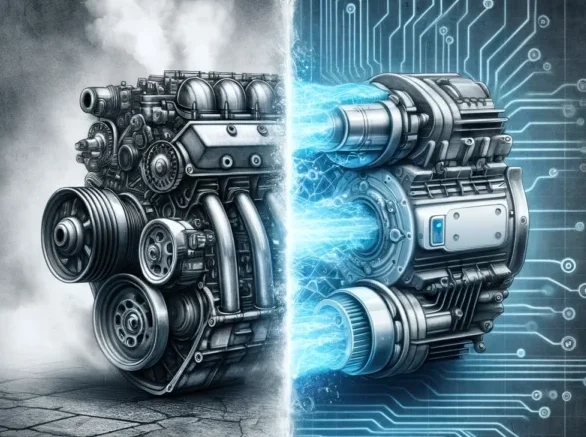
- 288 views
By clercity24
Let’s compare gas vs. electric motors. The advantages of one over the other are very clear!
Power Source:
- Gas Engines: Use internal combustion engines (ICE) powered by gasoline or diesel. These engines burn fuel inside the engine itself to create power.
- Electric Engines: Use electric motors powered by electricity stored in batteries. They convert electrical energy from the batteries into mechanical energy.
Mechanical Complexity:
- Gas Engines: Typically more complex with more moving parts such as pistons, crankshafts, valves, and a fuel injection system. This complexity generally requires more maintenance.
- Electric Engines: Have fewer moving parts with the primary component being the electric motor and its rotor. This simplicity means electric engines usually require less routine maintenance.
Energy Efficiency:
- Gas Engines: Less efficient at converting the stored energy in fuel to power the vehicle, with a significant amount of energy lost as heat. Typically, gas engines are about 20-30% efficient.
- Electric Engines: More efficient at converting energy to power, with efficiencies typically above 60%, as they directly convert electrical energy to motion with less heat loss.
Emissions:
- Gas Engines: Produce tailpipe emissions, including carbon dioxide, carbon monoxide, nitrogen oxides, and particulate matter, contributing to air pollution and greenhouse gas emissions.
- Electric Engines: Produce no tailpipe emissions, although the overall environmental impact depends on how the electricity is generated (e.g., using renewable resources vs. fossil fuels).
Noise:
- Gas Engines: Generally noisier due to the combustion process and mechanical workings.
- Electric Engines: Operate more quietly, which reduces noise pollution.
Torque and Performance:
- Gas Engines: Torque and power delivery depend on engine speed, and they usually need a transmission to optimize power delivery across different speeds.
- Electric Engines: Provide instant torque and can maintain consistent torque across a wide range of speeds, often resulting in quicker acceleration.
These differences illustrate why electric vehicles are considered to be more environmentally friendly and less costly to maintain, though the upfront cost can be higher and the infrastructure for charging is still developing in many areas. Consider Cler hubs & electric vehicles as a cost effective way to transition your gas powered fleet to electric.